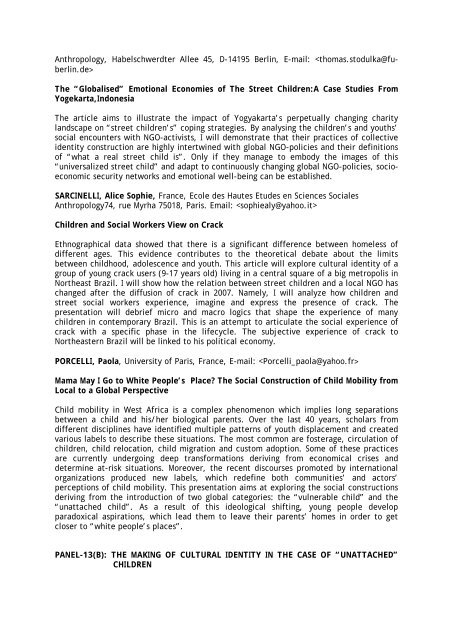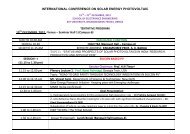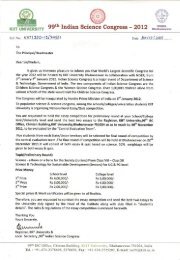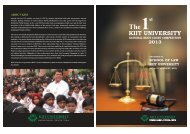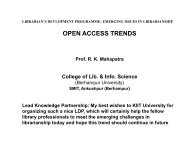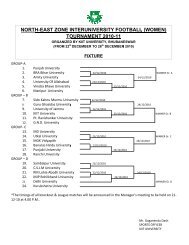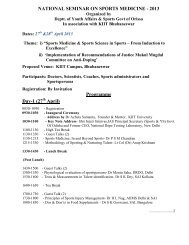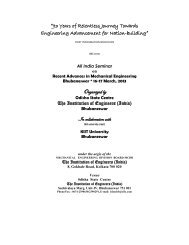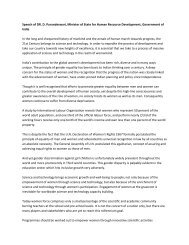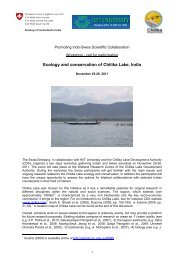PANEL ORGAN - KIIT University
PANEL ORGAN - KIIT University
PANEL ORGAN - KIIT University
Create successful ePaper yourself
Turn your PDF publications into a flip-book with our unique Google optimized e-Paper software.
Anthropology, Habelschwerdter Allee 45, D-14195 Berlin, E-mail: <br />
The “Globalised” Emotional Economies of The Street Children:A Case Studies From<br />
Yogekarta,Indonesia<br />
The article aims to illustrate the impact of Yogyakarta’s perpetually changing charity<br />
landscape on “street children’s” coping strategies. By analysing the children’s and youths’<br />
social encounters with NGO-activists, I will demonstrate that their practices of collective<br />
identity construction are highly intertwined with global NGO-policies and their definitions<br />
of “what a real street child is”. Only if they manage to embody the images of this<br />
“universalized street child” and adapt to continuously changing global NGO-policies, socioeconomic<br />
security networks and emotional well-being can be established.<br />
SARCINELLI, Alice Sophie, France, Ecole des Hautes Etudes en Sciences Sociales<br />
Anthropology74, rue Myrha 75018, Paris. Email: <br />
Children and Social Workers View on Crack<br />
Ethnographical data showed that there is a significant difference between homeless of<br />
different ages. This evidence contributes to the theoretical debate about the limits<br />
between childhood, adolescence and youth. This article will explore cultural identity of a<br />
group of young crack users (9-17 years old) living in a central square of a big metropolis in<br />
Northeast Brazil. I will show how the relation between street children and a local NGO has<br />
changed after the diffusion of crack in 2007. Namely, I will analyze how children and<br />
street social workers experience, imagine and express the presence of crack. The<br />
presentation will debrief micro and macro logics that shape the experience of many<br />
children in contemporary Brazil. This is an attempt to articulate the social experience of<br />
crack with a specific phase in the lifecycle. The subjective experience of crack to<br />
Northeastern Brazil will be linked to his political economy.<br />
PORCELLI, Paola, <strong>University</strong> of Paris, France, E-mail: <br />
Mama May I Go to White People’s Place The Social Construction of Child Mobility from<br />
Local to a Global Perspective<br />
Child mobility in West Africa is a complex phenomenon which implies long separations<br />
between a child and his/her biological parents. Over the last 40 years, scholars from<br />
different disciplines have identified multiple patterns of youth displacement and created<br />
various labels to describe these situations. The most common are fosterage, circulation of<br />
children, child relocation, child migration and custom adoption. Some of these practices<br />
are currently undergoing deep transformations deriving from economical crises and<br />
determine at-risk situations. Moreover, the recent discourses promoted by international<br />
organizations produced new labels, which redefine both communities’ and actors’<br />
perceptions of child mobility. This presentation aims at exploring the social constructions<br />
deriving from the introduction of two global categories: the “vulnerable child” and the<br />
“unattached child”. As a result of this ideological shifting, young people develop<br />
paradoxical aspirations, which lead them to leave their parents’ homes in order to get<br />
closer to “white people’s places”.<br />
<strong>PANEL</strong>-13(B): THE MAKING OF CULTURAL IDENTITY IN THE CASE OF “UNATTACHED”<br />
CHILDREN


